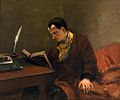Portal:Poetry
Welcome to the Poetry Portal


Poetry (from the Greek word poiesis, "making") is a form of literary art that uses aesthetic and often rhythmic qualities of language to evoke meanings in addition to, or in place of, literal or surface-level meanings. Any particular instance of poetry is called a poem and is written by a poet.
Poets use a variety of techniques called poetic devices, such as assonance, alliteration, euphony and cacophony, onomatopoeia, rhythm (via metre), and sound symbolism, to produce musical or other artistic effects. They also frequently organize these effects intos, which may be strict or loose, conventional or invented by the poet. Poetic structures vary dramatically by language and cultural convention, but they often use rhythmic metre (patterns of syllable stress or syllable (mora) weight). They may also use repeating patterns of phonemes, phoneme groups, tones (phonemic pitch shifts found in tonal languages), words, or entire phrases. These include consonance (or just alliteration), assonance (as in the dróttkvætt), and rhyme schemes (patterns in rimes, a type of phoneme group). Poetic structures may even be semantic (e.g. the volta required in a Petrachan sonnet).
Most written poems are formatted in verse: a series or stack of lines on a page, which follow the poetic structure. For this reason, verse has also become a synonym (a metonym) for poetry. (Full article...)
Selected article

It describes how Sir Gawain, a knight of King Arthur's Round Table, accepts a challenge from a mysterious "Green Knight" who challenges any knight to strike him with his axe if he will take a return blow in a year and a day. Gawain accepts and beheads him with his blow, at which the Green Knight stands up, picks up his head and reminds Gawain of the appointed time. In his struggles to keep his bargain Gawain demonstrates chivalry and loyalty until his honour is called into question by a test involving Lady Bertilak, the lady of the Green Knight's castle.
The poem survives in a single manuscript, the Cotton Nero A.x., which also includes three religious narrative poems: Pearl, Purity and Patience. All are thought to have been written by the same unknown author, dubbed the "Pearl Poet" or "Gawain Poet", since all four are written in a North West Midland dialect of Middle English. (Full article...)
Selected image

Poetry WikiProject

Selected biography

Mário Raul de Morais Andrade (October 9, 1893 – February 25, 1945) was a Brazilian poet, novelist, musicologist, art historian and critic, and photographer. One of the founders of Brazilian modernism, he virtually created modern Brazilian poetry with the publication of his Paulicéia Desvairada (Hallucinated City) in 1922. He has had an enormous influence on modern Brazilian literature, and as a scholar and essayist—he was a pioneer of the field of ethnomusicology—his influence has reached far beyond Brazil.
Andrade was the central figure in the avant-garde movement of São Paulo for twenty years. Trained as a musician and best known as a poet and novelist, Andrade was personally involved in virtually every discipline that was connected with São Paulo modernism, and became Brazil's national polymath. His photography and essays on a wide variety of subjects, from history to literature and music, were widely published. He was the driving force behind the Week of Modern Art, the 1922 event that reshaped both literature and the visual arts in Brazil, and a member of the avant-garde "Group of Five." The ideas behind the Week were further explored in the preface to his poetry collection Pauliceia Desvairada, and in the poems themselves.
After working as a music professor and newspaper columnist he published his great novel, Macunaíma, in 1928. Work on Brazilian folk music, poetry, and other concerns followed unevenly, often interrupted by Andrade's shifting relationship with the Brazilian government. At the end of his life, he became the founding director of São Paulo's Department of Culture, formalizing a role he had long held as the catalyst of the city's—and the nation's—entry into artistic modernity. (Full article...)
Did you know (auto-generated) -

- ... that the illustrations in the 1992 video game Tetris Classic are based on scenes from Alexander Pushkin's poem Ruslan and Ludmila?
- ... that Isabella Correa was one of the few Jewish women poets active in the Netherlands before the 19th century?
- ... that poet Peggy Pond Church became a strong pacifist and a member of the Society of Friends after the Manhattan Project used her home as a place to build nuclear weapons?
- ... that the tallest captive elephant in Asia has been commemorated in verse, sculpture and film?
- ... that hefker, unowned property in Talmudic law, came to express both personal freedom and societal abandonment in 20th-century Yiddish poetry?
- ... that Soepojo Padmodipoetro, despite being the highest administrator of Gadjah Mada University, could not attend its meetings?
Selected poem
| Jabberwocky by Lewis Carroll |
|---|
|
'Twas brillig, and the slithy toves
Did gyre and gimble in the wabe; "Beware the Jabberwock, my son! He took his vorpal sword in hand: And as in uffish thought he stood, One, two! One, two! And through and through "And hast thou slain the Jabberwock? 'Twas brillig, and the slithy toves |
Related portals
Topics
Recognized content
Categories
Associated Wikimedia
The following Wikimedia Foundation sister projects provide more on this subject:
-
Commons
Free media repository -
Wikibooks
Free textbooks and manuals -
Wikidata
Free knowledge base -
Wikinews
Free-content news -
Wikiquote
Collection of quotations -
Wikisource
Free-content library -
Wikiversity
Free learning tools -
Wiktionary
Dictionary and thesaurus





















